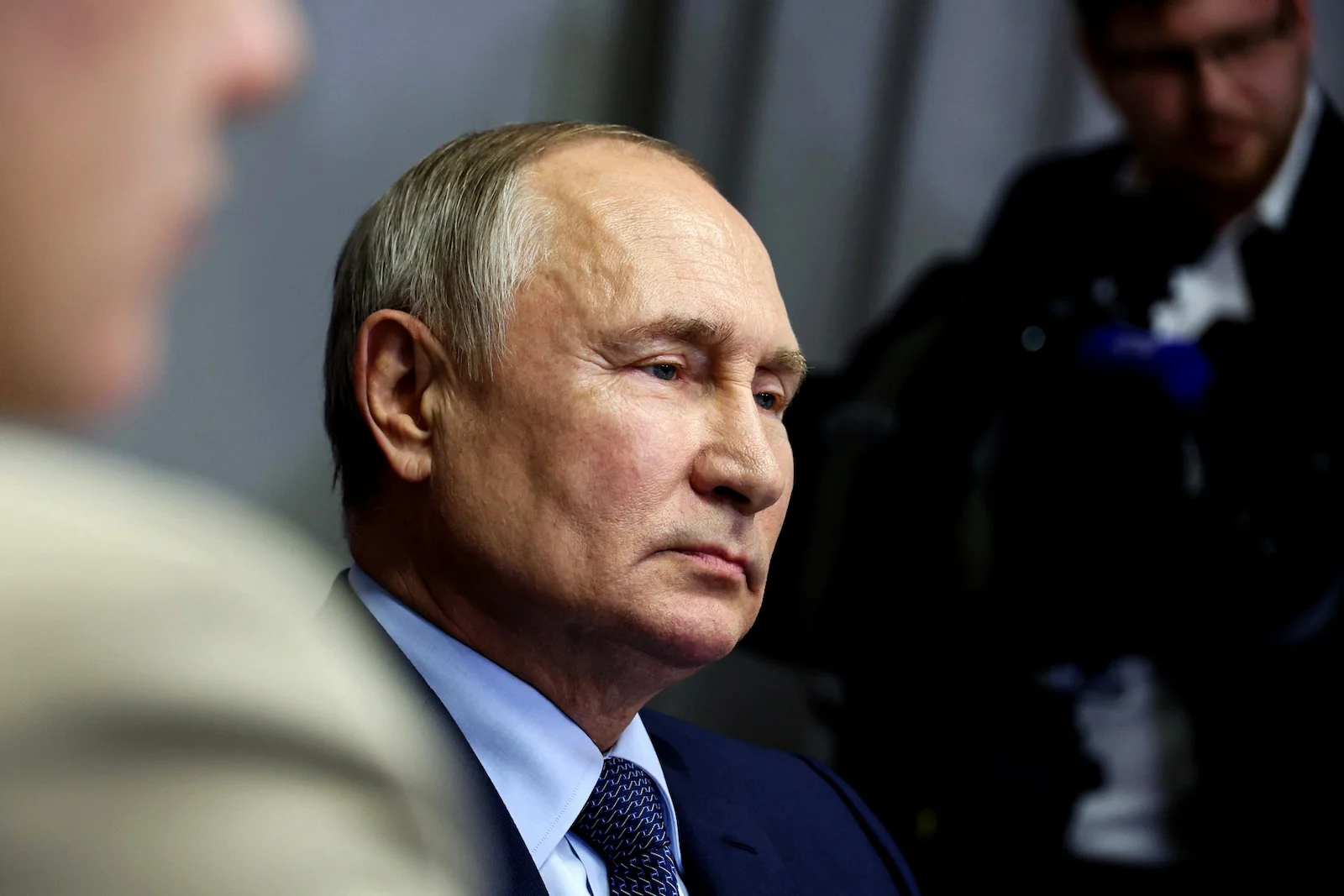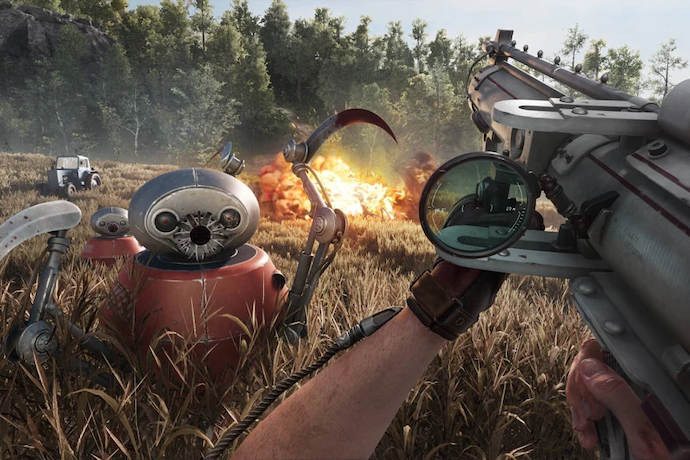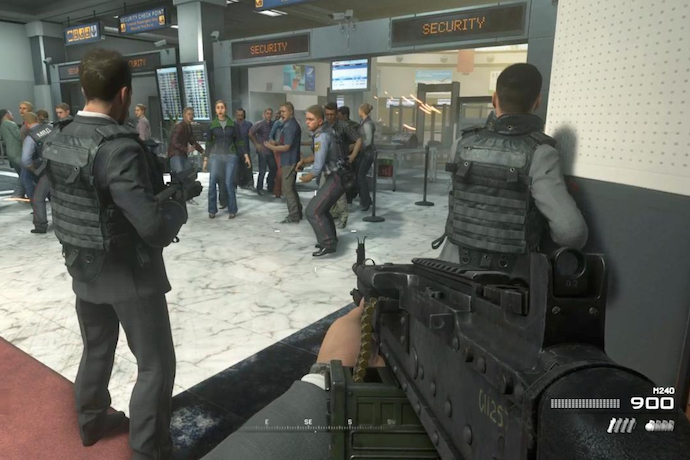
How Russia Uses Video Games as Modern Propaganda
This interview features researcher who, for safety reasons, asked to remain anonymous about the use of video games as propaganda tools by the Russian Federation. The researcher delves into how Russian-produced games often cast Russia as the hero and portray the West as the enemy, aiming to shape young minds and normalize violence—a pathway that can lead to military recruitment.
The discussion examines ethical concerns surrounding popular games like Atomic Heart and the pressing need for regulatory oversight. The researcher also reveals how Russian government funding supports pro-war games, spreading harmful narratives to young audiences worldwide.
The interview below has only been edited for clarity and readability.
How does Russia’s use of propaganda in video games differ from that of other countries?
To summarize, propaganda isn’t always negative; it can also be used positively in video games. For example, in some games like Call of Duty, you can’t kill civilians, and you can’t harm fellow soldiers because that would be considered a war crime.
Speaking of civilians, it’s good that video games reflect this reality. They show, “No, you can’t harm civilians because that’s a war crime,” and if you do, the game restarts the mission. I appreciate that. But when it comes to Russian video games and their propaganda, it’s often more aggressive.
As you mentioned, yes, many Russian men were raised playing harsh and difficult games, some of which allow players to kill civilians. Russian propaganda frequently presents America, Britain, and other Western countries as enemies. You might hear this from Russian players when they talk about civilians and the military. In many Russian games, Russia is depicted as the hero. At the same time, the rest of the world is portrayed as the enemy. Children grow up learning these narratives through gaming.

The problem with Russian video games, as I see it, is that young players can’t fully analyze the content. Video games provide comfort—sitting in your room, in your comfortable chair, using your computer, and you don’t expect to encounter propaganda. You might assume every historical event in the game is true and won’t fact-check everything. That’s where Russian influence comes in.
We can talk about shooting, historical, and strategy games. Russia has a system where they teach their version of history in one game, how to shoot in another, and how to follow Russian politics in a third. This is the concern: as President Putin himself has implied, children grow up learning these narratives, and when they eventually go to war, like in Ukraine, they bring those same narratives to the battlefield.
In what ways do video games become tools for political influence and recruitment? Given that players are often already immersed in combat scenarios, does this make them more susceptible to real-life recruitment efforts?
Yes, that’s the problem. Another issue with video games is that they often create cult figures. For example, you may be familiar with Ghost from Call of Duty. Russian players can also form attachments to these figures. Have you ever heard of Atomic Heart?
No?
Atomic Heart is a Russian video game created for a global audience, including U.S. and European Union players. The game doesn’t explicitly say, “We oppose the West” or “We don’t support Ukraine,” but it subtly glorifies the USSR. It presents a world where the USSR won the Cold War, implying that the world would be much better if the Soviet Union had been victorious. This narrative could influence Western players to think a Soviet victory would have led to a better world.
Maybe I don’t trust my politicians, and maybe Putin is seen as a strong man. We had to listen to him because Russia is perceived as a strong country. After all, it has a strong leader. So, it’s almost a strange form of propaganda based on self-esteem, you know, in terms of nationalistic pride—a powerful leader, therefore, a powerful country.
This becomes the foundation for making people more receptive to war efforts. If you’re looking at who this targets, I’m aware that this targets kids who become young adults—18, 19, and 20 years old. These people are more likely to be susceptible to recruitment efforts because, as we know, the brain isn’t fully developed at that age. By that point, they’ve been absorbing these propaganda narratives in video games for years.

The next thing we should talk about is cooperative online games. This is an area where Russia works effectively. They have different communities in various online games, and there is a huge number of young people who support Putin. We call them “Z patriots,” those who support the war, and all the “Z” propaganda. They’re young when they join these groups, and some administrators guide them. These administrators can push certain narratives and spread propaganda. Then, this kid comes to other kids and says, “Let’s play Counter-Strike or League of Legends or some other cooperative online games. Join this clan or group, and you can play with us.” They spread messages and narratives there, and we’re talking about children.
Many people from Russia, who were raised in these online games with propaganda, have come to Ukraine, and they’re fighting against us using the same narratives they were taught in the games. That’s a real problem.
What about young people in annexed areas? Considering long-term occupations like Crimea, Donetsk, and Luhansk, how are Ukrainian children—living under Russian propaganda and tight control—affected? Are there clear signs that, after years in these systems, they are being drawn into military recruitment efforts and, eventually, fighting for the Russian Federation?
Yes, that’s an important aspect to consider. We shouldn’t just focus on people from occupied regions like Crimea, Donetsk, or Luhansk. We need to talk about all of Ukraine. People tend to think of games as a way to relax after a hard day at work or school. But when they come to these games to relax, that’s when the propaganda starts.
The problem with Russian propaganda in games is that it’s aggressive and teaches people how to think and act. In many online games, many Ukrainians openly say they are from Ukraine. When you communicate with random people in these games, you often meet someone for the first time in your life, and that interaction can shape perceptions. The propaganda embedded in these games is deeply concerning.
And here comes the question: Is there any Russian here? Then, a Ukrainian answers “yes” because he understands the Russian language, but instead of saying that, he says he is Russian. Over time, for two or three years and beyond, young Ukrainians in online games say they are Russian.
Then they enter the Russian information space—they watch Russian films, listen to Russian music, and play Russian computer games. This is where Russia comes in, as they have people they’ve raised in these online games and communities, and they can spread a huge amount of material. When we reached the full-scale invasion, many collaborators had already been immersed in Russian information spaces.
Many Russian agents, some of whom met with Russian operatives from the FSB in computer games or on platforms like Discord, had cultivated these connections. It’s much easier to find someone you can manipulate into committing an act of sabotage in Ukraine, such as killing a Ukrainian officer using computer games. You start by contacting a Ukrainian, playing games together, gifting them online items, and then saying, “Hey, would you like to earn some money?” Eventually, you might offer them a large sum to carry out an illegal act. This is the problem with some Russian online communities.
How does this issue intersect with human rights law? Are there specific codes or frameworks that address this kind of propaganda targeting occupied populations, especially in regions like Donetsk, Luhansk, and Crimea?
You mean human rights in the context of computer games, yes?
You mentioned that in some Western-made games, killing a civilian can result in mission failure, while in others, civilian deaths have no such consequence. This seems to underscore a respect for civilian life in some games and an indifference in others. How do these differences align with legal or human rights frameworks? Have there been any legal developments addressing the use of video games as propaganda tools, or is this too new a field for legal studies to have caught up?
There was an interesting case with Call of Duty: Modern Warfare. There’s one mission called “No Russian,” where you play as an American agent infiltrating a group of Russian terrorists, and your mission is to commit a terrorist attack at Domodedovo Airport in Moscow. You use a gun to kill civilians—lots of civilians—in the airport.
When the game was released, Russians were outraged. They said, “Everyone, what is this mission? What is happening?” If I’m not mistaken, the game was released around 2008, but I’m unsure of the exact date. The mission was shocking because you’re playing as an American agent aiding Russian terrorists, and your goal is to kill Russian civilians at a Moscow airport. It’s not prohibited in that mission to kill civilians—that’s the objective. However, in some other games, especially war simulators, there are restrictions like the ones we discussed.
You can’t kill civilians. You can’t bomb certain objects, but it doesn’t always work. The problem is that when people from childhood play games where they can bomb everything and kill everyone, including civilians and non-combatants, they may become desensitized and commit these crimes in real life. That’s an issue with some computer games—they lack restrictions that should be there. This is where propaganda comes in.
When many violent actions are committed in games, and there are no restrictions or prohibitions, the player may think, “Well, this game shows me this so that I can do that in real life.” Because they assume that if something were wrong, the game would tell them. And that’s a major issue as well.
How can we counter these forms of propaganda? These games aren’t just pervasive in popular media; they enter people’s homes, often without oversight. In North America, for instance, children may play unsupervised for hours. Given this longstanding lack of parental or governmental oversight, is it feasible to counteract propaganda embedded in video games?
That’s a great question. Here, we encounter a problem. It’s better not to repeat violent behaviors in games—it’s better to tell players that certain actions are bad and provide arguments for why. For example, if we ban all Russian games, we’ll face issues regarding freedom of speech and business. So, politicians and governments need to speak out, saying, “This game is bad because it glorifies, for example, committing war crimes.”
When Atomic Heart was published in Ukraine, it was good that other governments reacted. They sent requests to platforms like Steam and PlayStation Store, asking them not to sell these games. If people in America buy Russian games, that money goes to Russia, potentially funding bombs that were financed by these games. And that’s something we must consider—not just the game’s plot but the financial implications.
Russia is currently creating a large number of pro-government games. In 2022, Russia announced it would provide studios with around $50 billion to support the pro-Russian video game industry. This is a political and legal issue. We’ll see many more Russian games and propaganda as this process unfolds.
They plan to release a game about the Wagner Group. Many people will play this game, where they’ll take the role of a private military company that has committed numerous war crimes in Syria and Ukraine. Of course, officially, they are not combatants and haven’t committed war crimes because they’re not recognized as such. But they are terrorists, and they show a terrorist style of warfare.
They demonstrate to young people, as they did in Syria, that beheading someone is acceptable. They even celebrated this in Syria, posting many photos of their actions on social media. That’s the kind of propaganda they’re spreading. In Russia, they had this code of conduct tied to the situation in Syria. Many people in video games use symbols from Syria as well.
They use hammers or axes for their profile pictures, which is disturbing. It’s harmful to young people because when you see something violent for the first time, it shocks you, but as you see it again and again, it becomes normalized. For example, when you see a hammer for the first time, you might think, “Oh, they hit someone in the head with that; that’s terrible.” However, observing the reaction of others, including your friends, normalizes the act. Then you might think, “Maybe it’s not so bad, maybe it’s even cool. Maybe I’m too kind.” And that’s the problem.
What do you see as the next frontier of cultural warfare—and counter-warfare—through video games, both during and after this conflict?
We’re already seeing it. Russia has created many games to promote the idea that war is good. For example, in 2008, during the war with Georgia, they created a game to normalize that invasion. The game is called Confrontation: Forcing Peace. They published this game after their conflict in Georgia, and it was disturbing because they were justifying their military actions through the game.
Young people who played this game in 2008 later came to Ukraine and believed the same narrative, thinking, “This is the same military operation, and we had to do this. If we don’t fight them, they will fight us.” It’s the George Orwell line, “War is peace,” or doublespeak.
Finally, on the subject of cultural doublespeak: do you have any parting thoughts on this issue that people should be aware of before we end today?
The main thing I want to say is that games are a safe place for risks, but you should always be aware of what you’re consuming—whether it’s something you’re listening to, reading, or playing. And especially if you have children, don’t just control them but engage with them. Ask your child what games they’re playing and who they’re communicating with.
The world of computer games and the Internet is cruel. Many bad people, games, scammers, and even agents exist. So, it must be if you control yourself and your children and always check the information you live in.
Excellent. I appreciate your time today.
Thank you.
